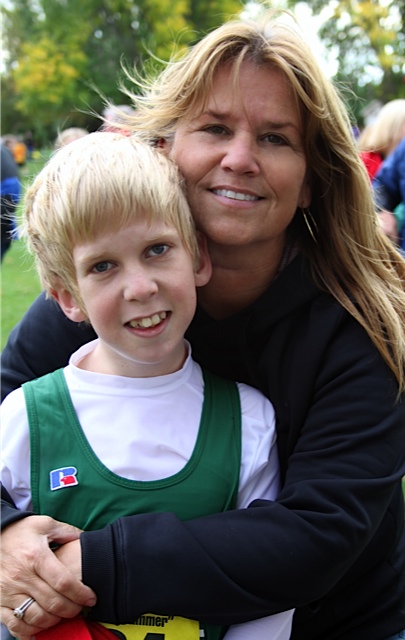IEPs, Sports, and Kids with Special Needs

Today, I’m happy to introduce my friend and guest blogger Naomi Norris. She’s here to share how she and her son’s school used IEPs to encourage her son to get involved in his middle school cross country team. If you read the story and would like to leave a comment for Naomi below, it will be passed on to her.
I was very proud as I read the digits on the official timer as each runner crossed the finish line…18 minutes, 10 seconds. That’s his best time yet! His first time was over 27 minutes because he had stopped to scream at his aide a couple of times and had a fit over some bugs flying around. This was a good time, and though he had stopped twice, he finished ahead of over forty other boys.
My son, Joshua, was born with a severe Pierre Robin Sequence, which caused him to be trached and tube-fed for his first 3 years of life while he underwent a series of corrective surgeries. He used a walker for 1 1/2 years and is small for his age. Josh is both autistic and mentally-challenged, requiring a full-time aide at school. Though he has these weaknesses in his life, he has an incredible personality that people love.
Until this fall, Josh had ridden the bus home each day after school, only to play video games and watch PBS until bedtime. Last spring I became concerned over this pattern developing in him. So when it was time to write a new IEP, I decided to include cross country in it. At the time, my husband was not on board with the idea. But the school agreed, and when the 7th grade cross country team assembled this fall, Josh Norris was on it. The only glitch was finding the right aide to run beside him. We knew of a young man who plays soccer and runs to stay in shape and asked if he would be willing to volunteer. He agreed, was approved by the school, and goes to every practice and meet with Josh. He is allowed to run with Josh in the meets, and even hold onto his arm or hand to lead him along. The goal is that by ninth grade, Josh will run independently and even be an asset to the team.
Josh was not happy about the change in his routine. He fought with his aide, hitting and kicking and throwing fits for the first week of practice. And did I mention his bug phobia? Dragonflies are especially terrifying to him, so he would rather stay indoors. Even so, after the first week, he started to enjoy being on the team. The other boys and coaches treat him well and seem to enjoy him. At one meet, he became irritable and upset halfway through, giving his aide some trouble. I watched as a young teammate ran alongside him, put his arm over his shoulders, and ran with him until he calmed down. Josh finished the race and even passed several boys before the finish line. Needless to say, Dad is now on board!
A woman approached us wanting to meet Josh after one race. She works for another school district and wanted to know how we got the school to agree to this. She fought for autistic kids in her district to be able to participate in school sports and lost. I told her to have the parents request it in the IEP. The school will be more likely to comply if it’s there. There’s always a way to make it work. Parents sometimes forget that they need to fight for their kids’ legal rights. Our school was very happy to make it happen for Josh, and we are grateful.
Final Note: For any parents struggling to raise your autistic child, I want to encourage you not to give up hope. Josh is my third child with autism. My oldest daughter couldn’t speak until she was 5, graduated high school with honors, and is now doing well in college. My 14-year-old son with autism struggled with horrible outbursts of profanity for years. He just started his freshman year of high school without a one-on-one associate and is completely off medications for the first time. He has a 3.4 GPA and is on the football team. Now we are focusing in getting Josh on track for life. We have always accepted our kids’ physical and emotional shortcomings, but have never underestimated them. Each child has had incredible strengths…these are what we have focused on, while continually teaching them self-discipline. Our children has been a wonderful gift from God, and we are grateful to Him for allowing us to have been their parents.
Do you like what you see at DifferentDream.com? You can receive more great content by subscribing to the quarterly Different Dream newsletter and signing up for the daily RSS feed delivered to your email inbox. You can sign up for the first in the pop-up box and the second at the bottom of this page.

By Naomi Norris
Naomi Norris lives in Iowa with her husband Rob and their four children. She is a stay-at-home mom who sometimes works with her husband in their real estate investment business. Her faith in Jesus Christ is first in her life, allowing her to be the mother and wife she has needed to be over the last 20 years. She has five children. Three of them have been diagnosed with autism and one died of a neurological cancer at age 3. Naomi and Rob have taken all their children overseas to expose them to different cultures and show them what true poverty looks like in the world. Naomi and her daughters are heavily involved in helping save the lives of orphans in Congo, Africa through orphan sponsorship and teaching orphans AIDS prevention.
2 Comments
Submit a Comment
Subscribe for Updates from Jolene
Related Posts
Why Did God Make Me this Way?
Guest blogger Steve Siler tells the story of his answer to his son’s question: “Why did God make me this way?”
Can Churches Help Families Raising Children with Disabilities Stay Together?
Can churches help families raising children with disabilities stay together? Guest blogger Mark Arnold explains his opinion.
The Physical Manifestations of Grief in Caregivers
Jolene explains how the heaviness of loss and sorrow can contribute to the physical manifestations of grief in caregivers.






Hi Ruth, you are right…though the parents’ request must be reasonable. Naomi’s story is a perfect example of reasonableness and cooperation. The parents found a willing volunteer. The school checked his background and approved him as an official school volunteer. Win, win!
Naomi: So great to read your post. I just went to a seminar in DM by ASK Resource Center and learned that IDEA law requires the school to provide for a child with disability to be able to participate in extra-curriculars. This includes providing an associate if necessary.